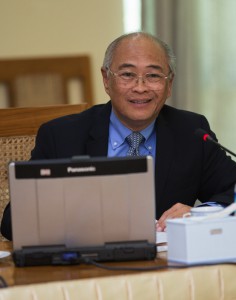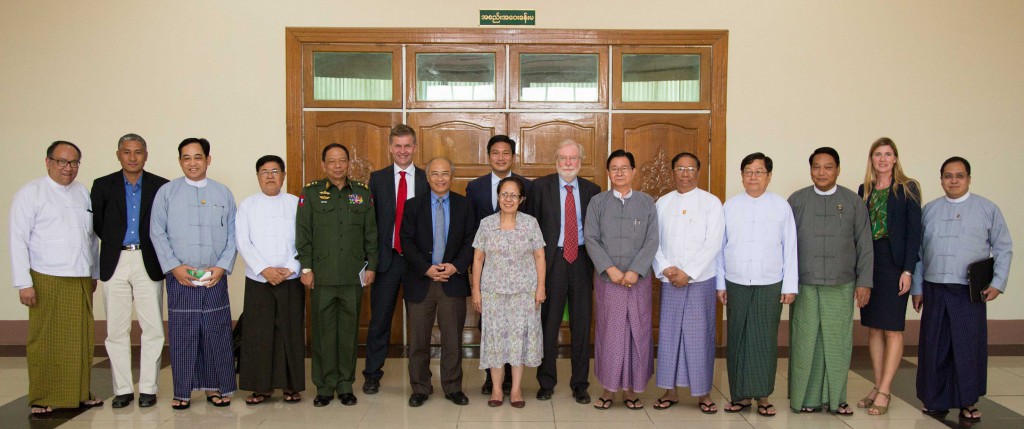 Myanmar, 5-6 March 2015 – Prof. Kuntoro Mangkusubroto was invited by the Beyond Ceasefires Initiative to speakat the second Peace Symposium of the Beyond Ceasefires Initiative. The symposium itself served as a discussion series bringing to Myanmar top speakers in fields of relevance to the Myanmar peace process to share experiences from around the world. Prof. Mangkusubroto was speaking alongside Sir Paul Collier (Award winning development economist from Oxford University), Ms. Emilia Pires (the Special Envoy of the g7+), Mr. Alejandro Eder (Colombia’s High Presidential Counselor for Reintegration and Director General of the Colombian Agency for Reintegration) and Mr. Erik Solheim (President Chair of the OECD-DA).
Myanmar, 5-6 March 2015 – Prof. Kuntoro Mangkusubroto was invited by the Beyond Ceasefires Initiative to speakat the second Peace Symposium of the Beyond Ceasefires Initiative. The symposium itself served as a discussion series bringing to Myanmar top speakers in fields of relevance to the Myanmar peace process to share experiences from around the world. Prof. Mangkusubroto was speaking alongside Sir Paul Collier (Award winning development economist from Oxford University), Ms. Emilia Pires (the Special Envoy of the g7+), Mr. Alejandro Eder (Colombia’s High Presidential Counselor for Reintegration and Director General of the Colombian Agency for Reintegration) and Mr. Erik Solheim (President Chair of the OECD-DA). Myanmar, 5-6 March 2015 – Prof. Kuntoro Mangkusubroto was invited by the Beyond Ceasefires Initiative to speakat the second Peace Symposium of the Beyond Ceasefires Initiative. The symposium itself served as a discussion series bringing to Myanmar top speakers in fields of relevance to the Myanmar peace process to share experiences from around the world. Prof. Mangkusubroto was speaking alongside Sir Paul Collier (Award winning development economist from Oxford University), Ms. Emilia Pires (the Special Envoy of the g7+), Mr. Alejandro Eder (Colombia’s High Presidential Counselor for Reintegration and Director General of the Colombian Agency for Reintegration) and Mr. Erik Solheim (President Chair of the OECD-DA).
Myanmar, 5-6 March 2015 – Prof. Kuntoro Mangkusubroto was invited by the Beyond Ceasefires Initiative to speakat the second Peace Symposium of the Beyond Ceasefires Initiative. The symposium itself served as a discussion series bringing to Myanmar top speakers in fields of relevance to the Myanmar peace process to share experiences from around the world. Prof. Mangkusubroto was speaking alongside Sir Paul Collier (Award winning development economist from Oxford University), Ms. Emilia Pires (the Special Envoy of the g7+), Mr. Alejandro Eder (Colombia’s High Presidential Counselor for Reintegration and Director General of the Colombian Agency for Reintegration) and Mr. Erik Solheim (President Chair of the OECD-DA).
The program that was guided by senior representatives of Ethnic Armed Organizations and the Myanmar Peace Center brought about critical and delicate questions for Myanmar’s future post-conflict settlements. Prof. Mangkusubroto delivered an address and presentation, which highlighted the learning from the post-conflict and post-disaster economic rebuilding of Aceh, development approach of the President’s Delivery Unit for Development Monitoring and Oversight (UKP4), and also the transformation of PT Timah, from heavy military involvement into a professional and public mining company. Prior to that, on 4-5 March, Prof. Mangkusubroto was also invited to be engaged in a series of strategic discussions with The Union Peacemaking Working Committee, high-level members of the Defense Services, and even with the Ethnic Armed Organizations’ leaders and representatives. Local leaders were truly engaged and keen to learn how to replicate success stories of post-conflict development especially from Indonesia. It was a rare opportunity to be involved in such a delicate process of nation building in our fellow neighboring country, Myanmar.
Contributor by: Dyah Ramadhani
The program that was guided by senior representatives of Ethnic Armed Organizations and the Myanmar Peace Center brought about critical and delicate questions for Myanmar’s future post-conflict settlements. Prof. Mangkusubroto delivered an address and presentation, which highlighted the learning from the post-conflict and post-disaster economic rebuilding of Aceh, development approach of the President’s Delivery Unit for Development Monitoring and Oversight (UKP4), and also the transformation of PT Timah, from heavy military involvement into a professional and public mining company. Prior to that, on 4-5 March, Prof. Mangkusubroto was also invited to be engaged in a series of strategic discussions with The Union Peacemaking Working Committee, high-level members of the Defense Services, and even with the Ethnic Armed Organizations’ leaders and representatives. Local leaders were truly engaged and keen to learn how to replicate success stories of post-conflict development especially from Indonesia. It was a rare opportunity to be involved in such a delicate process of nation building in our fellow neighboring country, Myanmar.
Contributor by: Dyah Ramadhani




